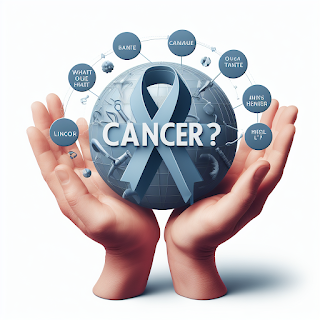Stay updated on what is trending in health. Discover tips and resources for a healthier, balanced life.
What is Cancer?
What is Cancer: Explore causes, symptoms, diagnosis and treatments. Stay informed on the latest research for effective prevention and management strategies.
DISEASES AND CONDITIONS
Dr. S. Ali
4/2/20252 min read


Cancer is a term that covers a wide range of diseases that involve abnormal cell growth with the potential to invade or spread to other parts of the body. Unlike normal cells, cancer cells do not respond to the signals that regulate cell division, death and repair. They can also evade the immune system and manipulate the blood vessels to supply them with oxygen and nutrients. Cancer can affect almost any organ or tissue in the human body, and it is one of the leading causes of death worldwide.
Types of Cancer
There are more than 100 types of cancer, each with different causes, symptoms, treatments and outcomes. Some of the most common types are breast cancer, lung cancer, prostate cancer, colorectal cancer, skin cancer and leukemia.
Causes of Cancer
Cancer can be caused by various factors, such as exposure to carcinogens (substances that cause cancer), tobacco use, obesity, poor diet, lack of physical activity, excessive alcohol consumption, certain infections, radiation and genetic mutations. Some of these factors can be avoided or modified to reduce the risk of developing cancer, while others are inherited or beyond our control.
Diagnosis of Cancer
Cancer is diagnosed by examining a sample of tissue or fluid from the affected area under a microscope or by using other tests that detect specific markers or genes associated with cancer. Imaging techniques such as X-rays, ultrasound, computed tomography (CT), magnetic resonance imaging (MRI) and positron emission tomography (PET) can also help locate and measure the size and extent of tumors.
What does the stage of cancer mean?
The stage of cancer describes how far it has spread in the body and helps determine the best treatment options and prognosis.
Treatment of Cancer
Cancer treatment depends on the type, stage and characteristics of the cancer, as well as the general health and preferences of the patient. The main types of treatment are surgery, radiation therapy, chemotherapy, targeted therapy, immunotherapy and hormone therapy. These treatments can be used alone or in combination to remove or destroy cancer cells, shrink tumors, prevent recurrence or metastasis (spread to other organs), relieve symptoms and improve quality of life. Some treatments may have side effects such as hair loss, nausea, fatigue, infection and pain.
Research on Cancer
Cancer research aims to find new ways to prevent, detect, treat and cure cancer. It also seeks to understand the biology and behavior of cancer cells and how they interact with their environment. Cancer research is conducted by scientists from various disciplines such as biology, chemistry, physics, engineering, medicine and nursing. They use methods such as laboratory experiments, animal models, clinical trials and epidemiological studies to test new drugs, devices, vaccines and strategies against cancer.
Conclusion
Cancer is a complex and challenging disease that affects millions of people around the world. However, thanks to advances in science and technology, many cancers can be prevented or cured if detected early and treated appropriately. There is also hope for improving the quality of life and survival of patients with advanced or incurable cancers through palliative care and supportive services. By raising awareness, funding research and supporting patients and their families, we can all contribute to the fight against cancer.
Related Articles:
1. Skin Cancer: What You Need to Know & How to Protect Yourself
2. Colon Cancer: What You Need to Know About This Silent Disease
3. Molar Pregnancy and Choriocarcinoma: Understanding, Coping, and Moving Forward
Sources:
National Cancer Institute (NCI) - What Is Cancer?
American Cancer Society (ACS) - Understanding Cancer
World Health Organization (WHO) - Cancer Fact Sheet
Pulse Your Health
Empowering you to achieve your health goals.
Contact
© 2026. All rights reserved.
Disclaimer: The content on this website is for informational purposes only and is not medical advice. Always seek the advice of your physician or other suitably qualified healthcare professional for diagnosis, treatment and your health related needs.
